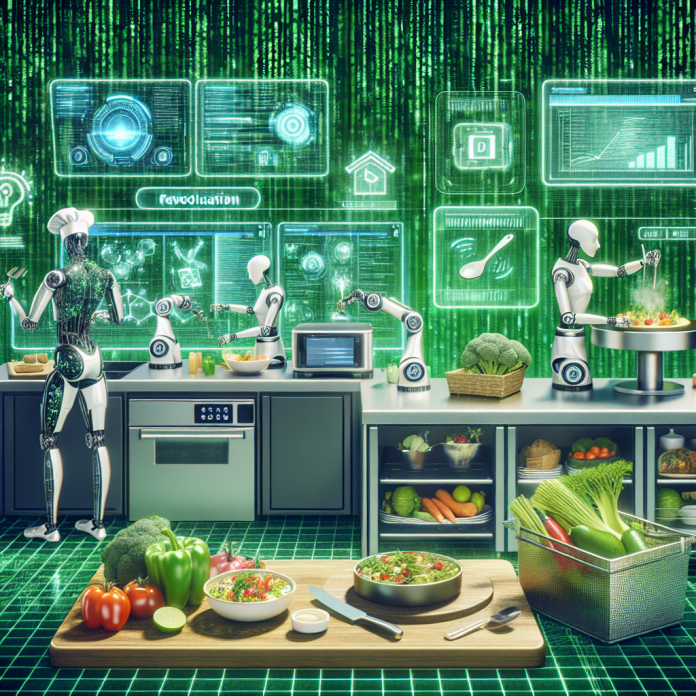AIʼs Influence on Food Industry
Introduction
The food industry is experiencing a revolution thanks to the integration of artificial intelligence (AI) technologies. From improving supply chain management to enhancing customer experiences, AI is driving innovation and efficiency in various aspects of the food industry. In this article, we will explore the impact of AI on the food industry and how it is redefining the way we produce, distribute, and consume food.
Enhancing Food Quality and Safety
One of the main advantages of AI in the food industry is its ability to improve food quality and safety. AI-powered systems can analyze data from various sources, such as sensors and cameras, to detect potential issues in food production and distribution. For example, AI can identify contaminants or spoilage in food products, helping to prevent foodborne illnesses and ensuring that consumers receive high-quality products.
Additionally, AI can help food producers monitor and control various factors that affect the quality of food, such as temperature, humidity, and storage conditions. By using AI-powered algorithms, food companies can optimize their processes and minimize waste, ultimately delivering fresher and safer products to consumers.
Optimizing Supply Chain Management
AI is also revolutionizing supply chain management in the food industry. With the help of AI-powered tools, companies can better forecast demand, optimize inventory levels, and streamline logistics operations. For instance, AI can analyze historical sales data and market trends to predict future demand, allowing food companies to adjust their production schedules and inventory levels accordingly.
Moreover, AI can help food producers and distributors optimize route planning and delivery schedules, reducing transportation costs and improving efficiency. By leveraging AI technologies, companies can ensure timely delivery of food products to retailers and consumers, ultimately enhancing customer satisfaction and loyalty.
Personalizing Customer Experiences
In today’s digital age, personalization is key to attracting and retaining customers. AI is enabling food companies to personalize customer experiences by analyzing data and predicting consumer preferences. For example, AI-powered recommendation engines can suggest personalized food and beverage options based on a customer’s past purchases, dietary preferences, and behavioral patterns.
Furthermore, AI can help food companies tailor their marketing campaigns to specific customer segments, increasing engagement and conversion rates. By leveraging AI technologies, food companies can create personalized promotions, discounts, and loyalty programs that resonate with individual consumers, ultimately driving sales and profitability.
Transforming the Restaurant Industry
AI is also transforming the restaurant industry, offering new opportunities for innovation and efficiency. For example, AI-powered robots and automation systems can help restaurants streamline their operations, reduce labor costs, and improve service quality. From cooking and food preparation to customer service and inventory management, AI is reshaping the way restaurants operate.
Moreover, AI can help restaurants optimize their menus, pricing strategies, and customer interactions. By analyzing customer feedback and behavior data, AI can help restaurants identify trends, preferences, and opportunities for improvement. With the help of AI technologies, restaurants can create innovative dishes, design compelling menus, and deliver exceptional dining experiences to their customers.
Case Studies
To illustrate the impact of AI on the food industry, let’s look at a few real-life examples of how companies are leveraging AI technologies to drive success and innovation.
1. Starbucks: Starbucks has been using AI-powered predictive analytics to optimize its supply chain and inventory management. By analyzing data from various sources, such as sales transactions, weather patterns, and social media mentions, Starbucks can predict demand, plan production schedules, and manage inventory levels effectively.
2. Domino’s Pizza: Domino’s Pizza has implemented AI-powered chatbots to enhance customer experiences and streamline order processing. Customers can use the chatbot to place orders, track deliveries, and provide feedback, making the ordering process more convenient and efficient.
3. Just Eat: Just Eat, a popular food delivery platform, has embraced AI to improve its recommendation engine and personalize customer experiences. By analyzing data from millions of transactions and customer reviews, Just Eat can suggest personalized food options to users, increasing engagement and order conversion rates.
Conclusion
AI is revolutionizing the food industry by enhancing food quality and safety, optimizing supply chain management, personalizing customer experiences, and transforming the restaurant industry. As AI technologies continue to evolve and mature, we can expect further innovations and advancements in how food is produced, distributed, and consumed. By embracing AI, food companies can stay ahead of the competition, drive growth, and deliver exceptional value to consumers worldwide.

